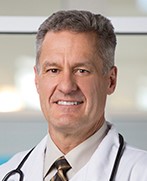
AAHPM reached out to the 2024 Visionaries to gain insight into what motivated them to pursue leadership positions and what they find more fulfilling in their experiences. Daniel Johnson, MD MA FAAP has been recognized as one of the exceptional individuals chosen as a 2024 AAHPM Visionaries in Hospice and Palliative Care.
Who has most influenced your work and how have they shaped your contributions?
I am grateful to my mentors, colleagues, and friends who have generously linked arms with me across my multi-decade journey in palliative medicine. A special thanks to Drs. Jean Kutner, Diane Meier, Susan Block, and Porter Storey – for role-modeling passion and persistence, and for always challenging me to stretch beyond what’s comfortable.
Nellie, you changed my life. As a 4th-year student, I couldn’t possibly grasp the impact you’d have on me for decades to come. You came into my life in a flash that cold December night – your frail frame, wheeled into the Denver Health ICU on a gurney. Between broken breaths, you shared your life’s joys, deepest loves, and your struggles to set free unfinished dreams. You helped me see what matters most.
Nellie, you unveiled true courage. Without drama, you informed me that it was “time to go.” I wasn’t ready to hear that – medicine had much more to offer. Seeing my anguish, and despite your own distress, you reached out to me in kindness. You held my hand saying, “it’s OK.” In that moment, I didn’t know what to do. Or how to be. I hadn’t learned that in medical school.
Nellie, I’m grateful for your wisdom. Your lessons that night moved me to change – to learn how to listen, connect deeply, and provide comfort and care without judgement. You motivated me to expand medical education and the way we teach. You stirred me to build more compassionate systems of care. You inspired me to lead.
What is the significance to you of being recognized as a Visionary in Hospice and Palliative Medicine?
To be recognized as a “visionary” by AAHPM and my peers is a magnificent and mindboggling honor! I admire and am in awe of the prior Visionaries, many of whom have served as my guides and confidantes for decades. I am grateful for the AAHPM community, a powerhouse of passion and expertise that has served as my steadfast “ballast” against healthcare’s ever-present winds of change.
This award validates my 1992 decision to unabashedly upend my professional career. Despite a successful and prosperous career as a geophysicist, I found myself ambivalent about my future. I wanted more – to make a real difference in the world. My goal, upon entering medical school at age 30, was to become a radiologist. It seemed a natural step to pivot my imaging expertise from earth to the human body. Caring for seriously ill and dying patients led me down a very different path. Nellie’s gift bestowed my professional life with new passion, purpose, and meaning.
Transforming vision into reality is impossible without teamwork and collaboration. I’m grateful for my Project on Death in America colleagues for role-modelling a resolute “can do” competence and determination. Thank you to my colleagues at the University of Colorado, the Life Quality Institute, the Center to Advance Palliative Care, and the Coalition to Transform Advanced Care. Finally, my deepest gratitude and appreciation for the unwavering support of my colleagues, partners, and the leadership at the Colorado Permanente Medical Group, Kaiser Permanente, and the exceptional team at KP’s Care Management Institute.
What is your aspiration for the evolution of hospice and palliative medicine?
During a recent “Palliative Care 101” small group session with the primary care interns, one of the physicians commented, “Dr. Johnson, isn’t palliative care just good medicine?” I asked the group to ponder the term “good medicine” and invited them to list potentially important features. I listened with great pride as the group called out things like respect for people, listening and leading with curiosity, leveraging the diversity of teams, being comfortable with silence, embracing conflict, responding to emotion, communicating with clarity, and recognizing and managing our own biases. I’ll never tire of these “aha” moments.
Although still early in the field’s development, it is clear to me that palliative medicine is changing the way health professionals care for ALL people, not just those with serious illness. Investments in access to specialty services, systematic education, and end-of-life research are creating new norms and expectations for serious illness care. I’m reassured to see an ever-increasing focus on effective communication, the value of EQ (not just IQ), evidence-based symptom management, and attention to equity. Our collective commitment is transforming healthcare – the way we work together as professionals, value differing perspectives, and care for ourselves and others.
My aspiration: let’s double down on that spread! Let’s employ the foundational principles of palliative care to lead beyond the care delivery system. Let’s embed ourselves in our organizational leadership, C-suites, boardrooms, and community partnerships. Let’s continue to harness the magic of palliative medicine to make our world a more connected, inclusive, and compassionate place.
Learn more about the AAHPM 2024 Visionaries in Hospice and Palliative Care and view a full list of all current and past Visionaries.
